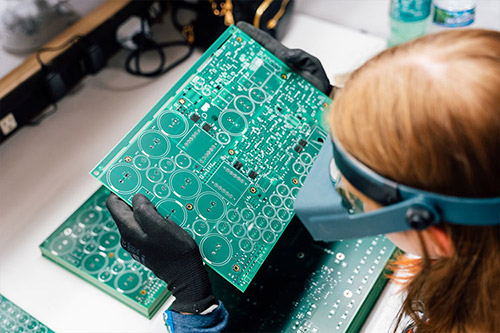Eight Public/Private Partnerships Strengthening Michigan’s Talent Pool
The Michigan Economic Development Corporation works with the state’s universities and local organizations to ensure businesses have access to the advanced talent they need to grow and succeed.
Q4 2022

Michigan’s No. 1 asset is its people — a workforce defined by integrity, grit, and a culture of innovation — who not only see what’s possible but rise to the challenge of making what may seem impossible a reality. To address today’s tight labor market, meet eight public/private partnerships in Michigan producing everything from hands-on industry experience to semiconductor apprenticeships.
Ford and the University of Michigan Advance Talent Innovation
Developed in cooperation with Ford Motor Company and the Michigan Economic Development Corporation, the University of Michigan (U-M) Battery Lab, a full-service, 9,000-square-foot battery cell fabrication and testing facility, is helping to advance the battery and robotics fields.
“We are fortunate to have the U-M Battery Lab in the area,” said Tobias Glossmann, principal systems engineer at Mercedes-Benz Research and Development North America located in Michigan. “The facility provides Mercedes-Benz with “lab capabilities to evaluate battery materials in large cells that represent real-life behavior.”
Ford further partnered with U-M on the Ford Robotics Building. The 134,000-square-foot complex allows students to collaborate with industry in state-of-the-art autonomous aerial vehicle fly zones, walking robot obstacle courses, an imitation of Mars' surface, and more.
Preparing the Semiconductor and Tech Talent Pipelines
Michigan has positioned itself as a leader in advocating for and supporting the semiconductor industry, from urging the passage of the CHIPS Act to developing workforce initiatives.
We are fortunate to have the U-M Battery Lab in the area. Tobias Glossmann, principal systems engineer, Mercedes-Benz Research and Development North America, Michigan. In May 2022, Michigan announced the $1.5 million Semiconductor Career and Apprenticeship Network (SCAN) Program grant. The SCAN Program will engage key microelectronics employers, end-users in automotive and manufacturing industries, and workforce development and education partners to build a more robust and knowledgeable talent pipeline for the industry.
“SCAN is a critical program that will provide economic opportunity and mobility to Michigan residents and support the health of the microelectronics industry by addressing its significant workforce challenges,” said Shari Liss, executive director of the SEMI Foundation. “We are thrilled to launch this important work in partnership with the strong workforce development organizations and ecosystem within Michigan.”
Michigan’s collaborative approach to workforce preparedness is well under way in IT and computer science. Grand Valley State University's Applied Computing Institute is connecting students with industry collaborators to solve computing problems, gaining the attention of Fortune 500 companies like Michigan-based Whirlpool. “The GVSU team understood the problem and independently executed it with agility within the time frame,” said Whirlpool lead engineer Dayanand Suldhal.
This innovation extends between both of Michigan’s peninsulas, with Michigan Technological University and nearby printed circuit boards-maker Calumet Electronics in the state’s Upper Peninsula partnering to bring hands-on manufacturing experience to engineering students.
Michigan has positioned itself as a leader in advocating for and supporting the semiconductor industry, from urging the passage of the CHIPS Act to developing workforce initiatives. Building an Equitable Talent Pipeline
Communities and institutions across the state are making sure Michiganders have access to quality K-12 education and beyond, readying them to jump into the workforce as skilled talent in their chosen professions and fill in-demand occupations.
The Detroit Regional Chamber’s Detroit Drives Degree is collaboratively working to increase the region’s post-secondary attainment rate from 43% to 60% and cut the racial equity gap in half. Meanwhile, the Urban Alliance in Kalamazoo partners with Kalamazoo Valley Community College and the Northside Association of Community Development to provide technical training for unemployed and underemployed individuals.
At the state level, the Sixty by 30 Alliance, comprised of economic development organizations, colleges and universities, workforce development initiatives, and professional associations is working toward 60% of working-age Michiganders to hold a certificate or college degree by 2030.
Communities and institutions across the state are making sure Michiganders have access to quality K-12 education and beyond. “We can see that Michigan adults are excited to pursue an associate degree or skills certificate,” says Susan Corbin, acting director of the Michigan Department of Labor and Economic Opportunity. “When you add in the 120,000 essential frontline workers who’ve applied for tuition-free college or high school completion, you’re talking about connecting over 170,000 Michiganders to good-paying jobs and businesses with the talent they need to thrive.”
Michigan is proactive and intentional in its workforce development as it prepares talent across the state for in-demand occupations that will innovate the future. Learn more about public/private partnerships, tools, and programs to support your corporate growth at MichiganBusiness.org.
Project Announcements
Coastal Ready Mix Plans Conway, South Carolina, Production Operations
12/20/2025
PRET Advanced Materials Expands Johnsonville, South Carolina, Manufacturing Operations
12/19/2025
Grupo Vialume Plans Colquitt, Georgia, Production Operations
12/19/2025
RelaDyne Expands Hebron, Kentucky, Operations
12/19/2025
Kroger Plans Simpson County, Kentucky, Distribution Operations
12/19/2025
Hines Furlong Line Expands Paducah, Kentucky, Operations
12/19/2025
Most Read
-
The Workforce Bottleneck in America’s Manufacturing Revival
Q4 2025
-
Rethinking Local Governments Through Consolidation and Choice
Q3 2025
-
Lead with Facts, Land the Deal
Q3 2025
-
Investors Seek Shelter in Food-Focused Real Estate
Q3 2025
-
America’s Aerospace Reboot
Q3 2025
-
Tariff Shockwaves Hit the Industrial Sector
Q4 2025
-
The Permit Puzzle and the Path to Groundbreaking
Q3 2025

